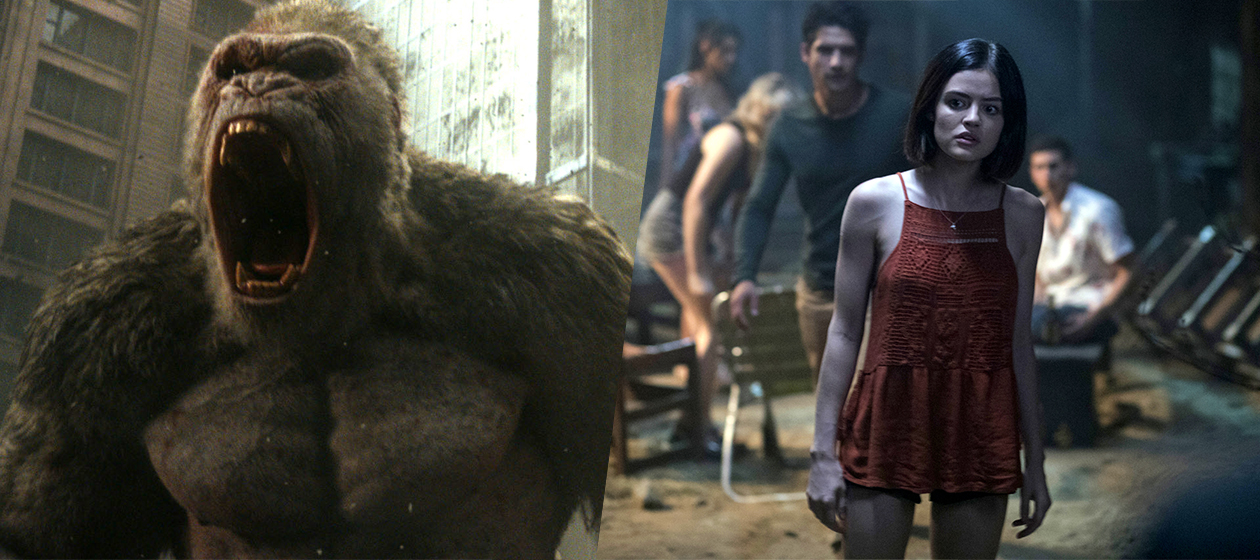The tween mistakes of Rampage and Truth or Dare
Rampage is a movie for 12-year-old boys seemingly made by 12-year-old boys. Truth or Dare is a movie for 12-year-old girls seemingly also made by 12-year-old boys.


A free daily email with the biggest news stories of the day – and the best features from TheWeek.com
You are now subscribed
Your newsletter sign-up was successful
Basing a movie on a game makes a certain amount of sense. Be it board, video, or party, and old game doesn't involve a beloved story to be painstakingly adapted; in some cases, a game provides little more than a premise. Really, they're marketing hooks sharpened by a vaguely comforting sense of nostalgia, which is all that some studios want out of "intellectual property" anyway.
This weekend brings a pair of additions to Game Cinema: Rampage, adapted from the old arcade game about monsters busting up buildings; and Truth or Dare, conceptually riffing off of the non-trademarked party game. Both very much belong to time-honored genres: Rampage is a monster movie as well as a disaster movie; Truth or Dare is a horror movie where a supernatural force stalks a group of young people. But they're similarly interesting in terms of how the games at their center shape and sometimes gender the material.
Of course, plenty of girls played Rampage at the arcade back in the day. But contrary to any number of statistics, gaming is still stereotyped as a male pursuit, and Rampage leans way into that perception. It's not just a movie designed for 12-year-old boys but seemingly by 12-year-old boys, aware of grown-up movie standbys like horrific violence and casual swearing but not especially adept at using them effectively.
The Week
Escape your echo chamber. Get the facts behind the news, plus analysis from multiple perspectives.

Sign up for The Week's Free Newsletters
From our morning news briefing to a weekly Good News Newsletter, get the best of The Week delivered directly to your inbox.
From our morning news briefing to a weekly Good News Newsletter, get the best of The Week delivered directly to your inbox.
It's not surprising that Rampage, in which Dwayne Johnson plays a primatologist whose gorilla bestie George is mutated into a larger, angrier monster and scuffles with a similarly enhanced wolf and crocodile, is a very silly movie. "B-movies with A-movie budgets" has been a much-used description of Hollywood blockbusters for going on two decades, and to an extent it applies here. But like San Andreas, the last movie Johnson made with director Brad Peyton, even the A-movie budget can't disguise how hollow and insubstantial all of the death and destruction feels, even in action-movie terms.
Some of Rampage is still fun, especially when several of the actors (including Jake Lacy, Jeffrey Dean Morgan, and Malin Akerman) chew up the scenery just before the monsters demolish it. A better movie would make them part of the joke; Rampage feels uncertain about whether there is a joke, or if so, what it should be. One character gets eaten by a gigantic crocodile, and Peyton stages it more or less like a mean grown-up getting pushed into a swimming pool in an old Nickelodeon movie. The movie wants to revel in its absurdity, yet never fully lets go of the idea that it could stumble its way into a superior monster-movie style exercise like Kong: Skull Island. That never happens; it's unmistakably a kid movie half-grown into its bad language and body count.
Johnson is the ideal figure to maintain this illusion of an all-ages blockbuster, because he's both a genuine star with clear presence in front of the camera and a barely-adolescent boy's idea of masculinity: Gigantic, muscular, kind to animals without doling out too many hugs, sweaty and bloodied but essentially bulletproof, and girl-adjacent but not really romantic. The filmmakers would probably argue the lack of romance is progressive, but the sidekick status of female lead Naomie Harris doesn't get upgraded just because she and Johnson never kiss. Especially when the movie still has George make sniggering sexual hand gestures about her. It would be a stretch to call Rampage charming (how many 12-year-old boys are?) but it certainly stays true to its tweenage heart.
Like Rampage, Truth or Dare is hardly a gender-exclusive phenomenon. Still, it's probably most commonly associated with young women at slumber parties, as one of the college-aged characters mentions early on. He's part of a mostly-callow group of seniors spending their last spring break in Mexico, lured, with hilarious improbability, to a burnt-out old cathedral, where a stranger nudges them into a round of Truth or Dare that gets a demonic force on their case. Once they're in the game, Olivia (Lucy Hale), her friend Markie (Violett Beane), and their friends must take infinite turns choosing to admit hard truths or perform life-threatening dares.
A free daily email with the biggest news stories of the day – and the best features from TheWeek.com
This is a blatant knockoff of both Final Destination and the artier It Follows, with only a smidge of the former's mordant wit and none of the latter's peerless dread-craft. But Truth or Dare does pay homage to the game's perceived roots through a compelling conflict between Olivia and Markie, lifelong friends who want to stay close "until life tears us apart," as one of them says. The movie is most provocative when poking at Olivia's supposed good-girl selflessness, something that the demonic game puts to the test. How deadly is the gap between your public nobility and your privately selfish feelings?
It's possible that this line of thinking could have been handled more interestingly by a female director. Instead, director and co-writer Jeff Wadlow often filters the female-friendship material through romantic or sexual rivalries, and the movie is too busy with gossipy, salacious, and weirdly obvious twists to dig into its own psychology. Truth or Dare has more to say to its imagined audience than Rampage — and its cynicism about its largely ill-tempered characters is thematic, rather than incidental. But both movies wind up too close to their roots: They're time-passers for girls and boys who don't yet feel comfortable around each other.
Jesse Hassenger's film and culture criticism has appeared in The Onion's A.V. Club, Brooklyn Magazine, and Men's Journal online, among others. He lives in Brooklyn, where he also writes fiction, edits textbooks, and helps run SportsAlcohol.com, a pop culture blog and podcast.
-
 Tourangelle-style pork with prunes recipe
Tourangelle-style pork with prunes recipeThe Week Recommends This traditional, rustic dish is a French classic
-
 The Epstein files: glimpses of a deeply disturbing world
The Epstein files: glimpses of a deeply disturbing worldIn the Spotlight Trove of released documents paint a picture of depravity and privilege in which men hold the cards, and women are powerless or peripheral
-
 Jeff Bezos: cutting the legs off The Washington Post
Jeff Bezos: cutting the legs off The Washington PostIn the Spotlight A stalwart of American journalism is a shadow of itself after swingeing cuts by its billionaire owner
-
 Walter Isaacson's 'Elon Musk' can 'scarcely contain its subject'
Walter Isaacson's 'Elon Musk' can 'scarcely contain its subject'The latest biography on the elusive tech mogul is causing a stir among critics
-
 Welcome to the new TheWeek.com!
Welcome to the new TheWeek.com!The Explainer Please allow us to reintroduce ourselves
-
 The Oscars finale was a heartless disaster
The Oscars finale was a heartless disasterThe Explainer A calculated attempt at emotional manipulation goes very wrong
-
 Most awkward awards show ever?
Most awkward awards show ever?The Explainer The best, worst, and most shocking moments from a chaotic Golden Globes
-
 The possible silver lining to the Warner Bros. deal
The possible silver lining to the Warner Bros. dealThe Explainer Could what's terrible for theaters be good for creators?
-
 Jeffrey Wright is the new 'narrator voice'
Jeffrey Wright is the new 'narrator voice'The Explainer Move over, Sam Elliott and Morgan Freeman
-
 This week's literary events are the biggest award shows of 2020
This week's literary events are the biggest award shows of 2020feature So long, Oscar. Hello, Booker.
-
 What She Dies Tomorrow can teach us about our unshakable obsession with mortality
What She Dies Tomorrow can teach us about our unshakable obsession with mortalityThe Explainer This film isn't about the pandemic. But it can help viewers confront their fears about death.
